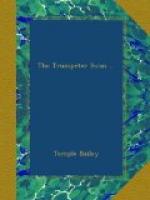It was not until he was safe in his sleeper, and racketing through the night, that he remembered the meeting with the literary swans and the editor with the shell-rimmed glasses. A telegram would convey his regrets. He was sorry that he could not meet them, but he had on hand a more important matter.
CHAPTER XVI
THE CONQUEROR
I
If Randy’s train had not missed a connection, he would have caught the same boat that took the Admiral and his party back to the island. They motored down to Wood’s Hole, and boarded the Sankaty, while Randy, stranded at New Bedford, was told there would not be another steamer out until the next day.
The Admiral was the only gay and apparently care-free member of his quartette. Becky felt unaccountably depressed. Louise sat in the cabin and worked on her green bag. There was a heavy sky and signs of a storm. It was not pleasant outside.
Archibald was nursing a grievance. “If your grandfather had only stayed over another day.”
“He had written Tristram that we would come. He is very exact in his engagements.”
“And he feels that fifty years in ’Sconset is better than a cycle anywhere else.”
“Yes. It will be nice to get back to our little gray house, and the moor, don’t you think?”
“Yes. But I wanted to show you Boston as if you had never seen it, and now I shall never show it.”
They were on deck, wrapped up to their chins. “Tell me what you would have shown me,” Becky said; “play that I am Olga and that you are telling me about it.”
He looked down at her. “Well, you’ve just arrived. You aren’t dressed in a silver-toned cloak with gray furs and a blue turban with a silver edge. That’s a heavenly outfit, Becky. But what made you wear it on a day like this?”
“It is the silver lining to my—cloud,” demurely; “dull clothes are dreadful when the sky is dark.”
“I am not sure but I liked you better in your brown—in the rain with your hand on my arm—— That is—unforgettable——”
She brought him back to Olga. “I have just arrived——”
“Yes, and you have a shawl over your head, and a queer old coat and funny shoes. I should have to speak to you through an interpreter, and you would look at me with eager eyes or perhaps frightened ones.”
“And first we should have gone to Bunker Hill, and I should have said, ’Here we fought. Not of hatred of our enemy, but for love of liberty. The thing had to be done, and we did it. We had a just cause.’ And then I should have taken you to Concord and Lexington, and I would have said, ’These farmers were clean-hearted men. They believed in law and order, they hated anarchy, and upon that belief and upon that hatred they built up a great nation.’ And thus ends the first lesson.”




